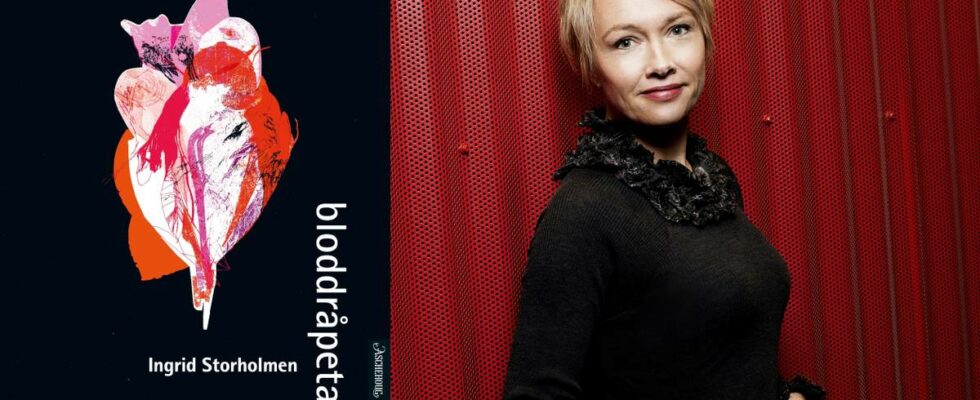Think of a number. For example, 1.5 million Norwegians state that they have long-term pain, but only 37 per cent of these ailments have a known cause. Could it be inherited pain? asks Ingrid Storholmen in the unique book “Bloddrapatall”. Another question she asks – and which she succeeds unusually well in answering – is: Who are all these people behind the statistics? Making the numbers dance Ingrid Storholmen challenges the notions of what a novel can be. She juxtaposes fiction and fact in a fruitful combination where each genre becomes stronger by virtue of the other. With a chorus of voices, she pulls the self-deceptive veil away from the fate that sooner or later awaits us all: illness, old age and death. But if you think this is going to be sad stuff, you’re on the wrong track. Here, for example, is the old man at the old people’s home asking for condoms. But there is probably no need for birth control for the residents here, he is told. No, but he now just wants to see if there is still a splash. The book is both myopic and wide-ranging: Storholmen goes into the innermost anxiety and out into the most existential musings. Einar is the first of about twenty voices to speak. He is called the post professor, since he likes to philosophize about big and small things. He is a widower, rural postman and knows most people: In an interview with Studio 2 on news P2, I heard Ingrid Storholmen herself say that she wanted to make the numbers dance. She has used the statistics as a trampoline to imagine ordinary people’s encounter with illness. Because from one day to the next, our lives can be completely changed. One day healthy, the next terminally ill. How we cope with illness can say a lot about who we are. But is it possible to say something about who is affected? Hear Ingrid Storholmen in Studio 2: Shows the social side of the disease Oh yes. Ingrid Storholmen, who has previously written about Chernobyl and Tirpitz, among other things, has gone to work systematically. She has read through research reports and doctoral dissertations that stem from the large health survey in Trøndelag (the HUNT project), where 250,000 Norwegians have participated with blood tests and questionnaires since the start in 1984. TRØNDER: Ingrid Storholmen comes from Verdal and made her debut in 2001 with the poetry collection “Krypskyttarloven”. She has received several prizes and honours, including the Hunger Prize in 2010. In the novel, she allows the voices of the various communities to alternate, and at the bottom of each book page she provides factual information from the HUNT survey. There, the statistics show in black and white that social conditions such as education and finances have a huge impact on which of us becomes seriously ill, and who heads for a premature death. In the book, the numbers become people. Here we meet the farmer who goes into a severe depression and ends up in prison after butchering his sheep. We meet the mother of the toddler who gets incurable cancer, and who brutally has to hear the girls ask what color she wants the coffin to be. We meet the woman who suffers a stroke and the man who becomes demented. All the narrators are introduced by their first name, except for Paulsen, the doctor, he who holds the patients’ health in his hand. In between the glimpses of ordinary life, Storholmen gives us a questionnaire or a graph. She has also submitted first-hand accounts from the violent mudslide that hit Verdal in 1893. The landslide that swept away 105 farms and claimed 116 lives. The trauma has affected generations. The horror has settled in the bodies of the survivors and their stories become examples that pain can be inherited. Hear the review in “Open book: The critics”: Tidenes tittle In the footnotes, Storholmen provides factual information from disease statistics. At the same time, she is playful, because she also connects to our common cultural heritage, whether the notes quote Sigrid Undset, Tor Jonsson, Hans Rotmo or Voluspå himself. The title is brilliant. It is written against the classic poem “Bloddrope-trall”, where Kristofer Uppdal writes about the blood that rushes in the spring that passes through human life only once. In everything that comes later, we long to return to youth, this rush of emotions, where everything was in the bud and everything was possible. Postman Einar quotes a bit of the poem, as the book begins with his very last trip. It is spring, and memories from a long life creep forward from the acute experiences of the landscape’s beauty: Spring opens sorrow, he says soon after, and his heart is filled with Sigrid, she was my symra. Actor Per Sunderland reads the poem “Bloddrope-trall” by writer Kristofer Uppdal. The poem is included in the selection of Norway’s best poem, in the program “Poetry & cursed lie”. It’s about us Ingrid Storholmen has written a novel about illness. It is also a story about roots, belonging, homeland and memories. In this sense, it has something in common with Kyrre Andreassen’s “Not people I can count on”, where the rural people also come forward, for better or for worse. We count, all of us. And we will be seen. It is a poignant gift from a writer who has followed his own path throughout his writing. Like Kristofer Uppdal’s effervescent “Bloddrope troll”, Ingrid Storholmen’s generous novel has classic potential. news reviewer Title: “Blood drop count” Author: Ingrid Storholmen Publisher: Aschehoug Genre: Novel Number of pages: 127 Published 02.12.2024, at 11.22
ttn-69
“Blood droplet” by Ingrid Storholmen – news Culture and entertainment

